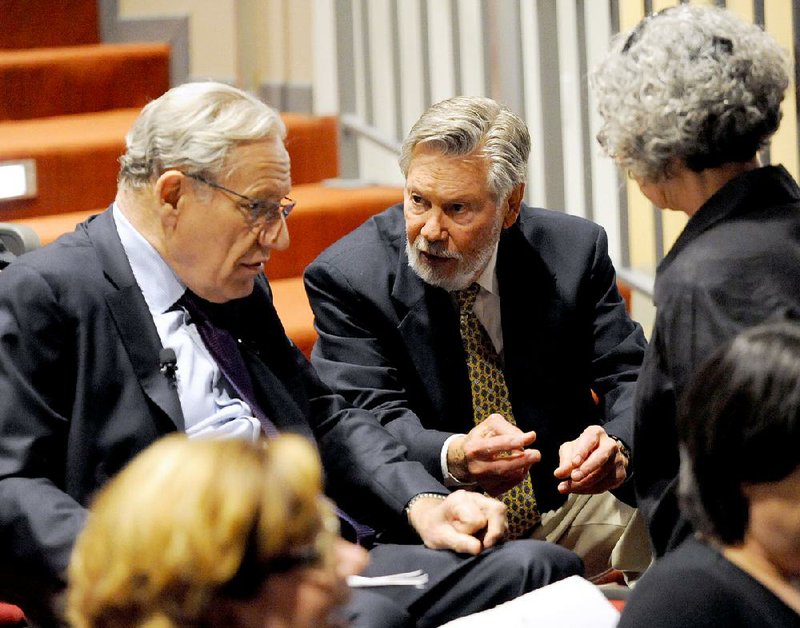FAYETTEVILLE -- The essential role of the president is to find "the next stage of good" for the country, famed political reporter Bob Woodward said Thursday at the University of Arkansas at Fayetteville.
"The president is the agenda-setter, and that next stage of good has to be broadly defined. It has to be defined not for an interest group, not for one party. It has to be for the whole population," Woodward said.
The author of more than a dozen books on the presidency and politics, Woodward gave the keynote speech for UA's Journalism Days event, sponsored by UA's Walter J. Lemke Department of Journalism.
He criticized President Barack Obama for failing to grasp the true power of the presidency, contrasting his leadership with former presidents.
As an example, Woodward noted the focus of former President Jimmy Carter to devote 13 days to reach the Camp David accords during his presidency. The negotiations brought stability and peace to relations between Israel and Egypt.
With Obama, "There isn't that sense of, let's take the most important thing and, whether literally or at least psychologically, go to Camp David and spend time against the problem," Woodward said.
Woodward also said former President George W. Bush grasped the influence that he could have simply by meeting with others, recalling how Bush once told an aide about that he can spend 90 seconds with someone and leave a lasting impression.
Woodward described Obama as smart and at times arrogant, but he also said Obama "knows where he came from, he knows how unlikely it is he would be president with that background."
With Obama, "there's also a humble side, where he holds himself back and does not use or does not deploy that 90 seconds or 13 days that a president has to get things done," Woodward said.
Woodward also told a story of how he shared his thoughts on Obama with a longtime Democratic senator who told him that Obama had phoned him twice in five years.
"Twice in five years," Woodward emphasized, making it clear that he felt this seemed to be remarkably little interaction between the president and the senator.
He praised former President Bill Clinton after remarking that he had been critical of certain aspects of his presidency in the past.
"If you look at the Clinton presidency, you could say peace, prosperity and Monica -- and it depends who you are and how you look at that," Woodward said, referring to Clinton's sexual relationship with Monica Lewinsky, which led to Clinton's impeachment on charges of perjury and obstruction of justice.
"As a journalist, I think the peace and prosperity is a pretty important political achievement. At the same time, the Monica situation, it came close to creating a constitutional crisis," Woodward said.
Woodward, 72, gained fame as a young journalist with The Washington Post by reporting details of a break-in at Democratic headquarters and subsequent cover-up efforts linked to President Richard Nixon. Woodward's work with fellow Post reporter Carl Bernstein and others earned a Pulitzer Prize for the Post.
The Watergate scandal, named after the building where the burglary took place, led Nixon to become the only U.S. president who has resigned from office.
In his talk, Woodward remarked on Nixon's self-centered attitude as expressed in audiotapes of his conversations with top aides.
"No one, including the president or his key aides, to my knowledge, ever says, 'What would be good for the country, what does the country need?'" Woodward said. "It's all about Nixon, it's all about using the power of the presidency to settle scores to fulfill Nixon's political ambitions."
Woodward also described a 2005 meeting with Hillary Clinton in which she told him she often quotes from a passage in a Woodward book about George W. Bush during speeches.
Woodward said Clinton told him she found it alarming that Bush told Woodward, in response to a question about how history will judge the war in Iraq, that it would take until after he and Woodward were both dead for history to judge his decisions.
"She said, in effect, 'You can't think and talk like that and be president of the United States,'" Woodward recalled, adding that he thinks Clinton's response to a similar question would be that she would write the account herself.
Woodward received $38,000 to speak both at UA and Friday at the Fayetteville Public Library. UA's Distinguished Lecture Series, funded with student fees, and the library are splitting the cost, according to university spokesman Steve Voorhies.
Metro on 04/11/2015
